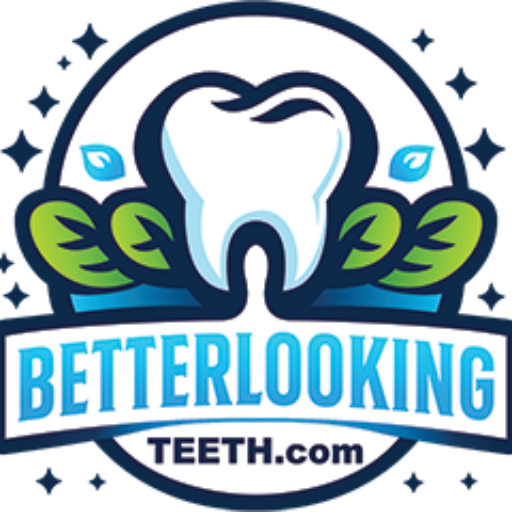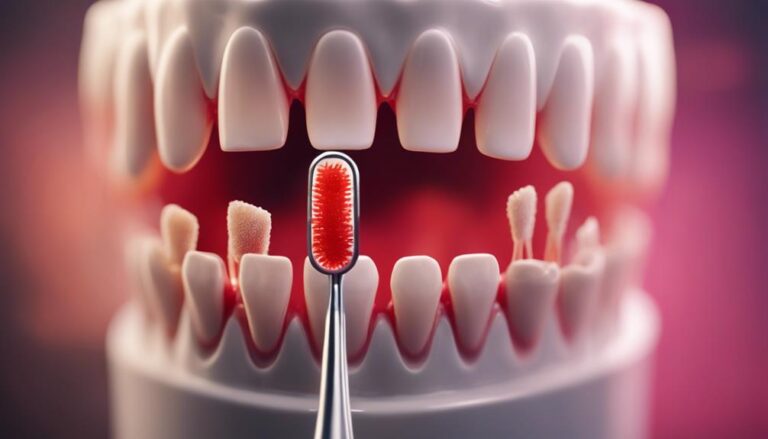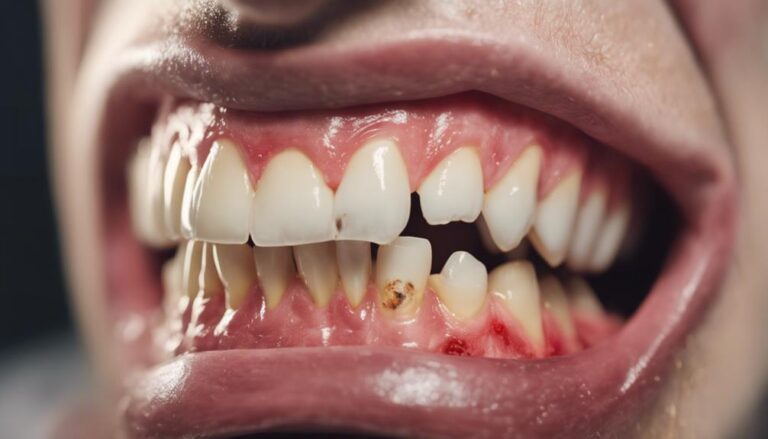Taking care of my gums at home is essential for preventing disease. Brushing at a 45-degree angle with a soft-bristled brush for two minutes helps remove plaque. Flossing with 18 inches of floss, curving it around each tooth, prevents gum disease. Mouthwash reduces plaque and gingivitis, promoting oral health. Using a tongue scraper removes bacteria and improves breath. A water flosser reaches difficult spots, ideal for sensitive gums. Incorporating gum-friendly foods and avoiding smoking are important. Regular check-ups aid in early detection. Electric toothbrushes and interdental brushes enhance cleaning. Exploring herbal remedies and mouthwashes can further support gum health.
Key Takeaways
- Regular brushing and flossing prevent gum disease.
- Use soft-bristled or electric toothbrushes for effective cleaning.
- Incorporate water flossing and interdental brushes for thorough plaque removal.
- Maintain a gum-friendly diet rich in vitamins and nutrients.
- Consider herbal remedies like mouthwashes and teas for gum health.
Importance of Oral Hygiene
Maintaining good oral hygiene is essential for preventing gum disease and maintaining overall oral health. Gum inflammation prevention is important because it can progress to more severe conditions if left untreated. Poor oral hygiene habits, such as inadequate brushing and flossing, can lead to the accumulation of plaque, a sticky film of bacteria. This buildup can irritate the gums, causing inflammation and potentially leading to gum disease.
Understanding the gum disease risks is crucial for implementing effective preventive measures. Factors like smoking, hormonal changes, certain medications, and genetic predisposition can increase the likelihood of developing gum disease. By practicing good oral hygiene, including regular brushing, flossing, and dental check-ups, these risks can be significantly reduced.
Toothbrush Techniques
Understanding proper toothbrush techniques is key to effectively removing plaque and preventing gum disease. Proper brushing involves holding the toothbrush at a 45-degree angle against the gum line, using gentle circular or back-and-forth motions. It’s important to brush all surfaces of the teeth, including the front, back, and chewing surfaces. To guarantee a thorough clean, spend at least two minutes brushing, focusing on each quadrant of the mouth.
Selecting the right toothbrush is also essential for maintaining oral health. Choose a soft-bristled brush to avoid damaging the gums and enamel. Replace your toothbrush every three to four months or sooner if the bristles become frayed. Additionally, consider using an electric toothbrush, which can be more effective at removing plaque when used correctly.
Incorporating correct technique into your daily oral care routine is vital for preventing gum disease and maintaining a healthy smile. By mastering proper brushing methods and selecting the right tools, you can effectively protect your gums and teeth from potential harm.
Flossing Fundamentals
Proper flossing technique is vital for removing plaque and maintaining healthy gums. To guarantee you’re flossing correctly, follow these steps:
Start with about 18 inches of floss and wind most of it around your middle fingers, leaving about 1-2 inches to work with. Hold the floss tightly between your thumbs and index fingers and gently slide it between your teeth using a back-and-forth motion. Curve the floss into a C-shape around each tooth and move it up and down to remove plaque and debris. Be sure to floss below the gumline as well.
Common mistakes in flossing include snapping the floss too hard against the gums, which can cause irritation and bleeding. Avoid sawing back and forth, as this can also harm the gums. Remember, flossing shouldn’t be painful. If you experience pain or bleeding, you may be using too much force. By mastering proper flossing techniques and avoiding these common mistakes, you can effectively remove plaque and prevent gum disease.
Benefits of Mouthwash
When considering oral hygiene routines, using mouthwash offers a range of benefits beyond just freshening your breath. Research suggests that incorporating mouthwash into your daily routine can help reduce plaque buildup, prevent gingivitis, and fight bad breath. There are various types of mouthwash available, including fluoride mouthwash, antiseptic mouthwash, and cosmetic mouthwash, each designed to target specific oral health concerns.
Studies have shown that mouthwash can reach areas in the mouth that brushing and flossing may miss, providing an added layer of protection against bacteria. The effectiveness of mouthwash in reducing harmful bacteria has been well-documented, making it a valuable tool in maintaining good oral health. Additionally, mouthwash can help to strengthen enamel, prevent cavities, and promote overall oral hygiene.
Incorporating mouthwash into your daily oral care routine can complement brushing and flossing, providing thorough protection against gum disease and other oral health issues. Remember to choose a mouthwash that suits your specific needs and consult with your dentist for personalized recommendations.
Tongue Scraper Benefits
Using a tongue scraper daily can offer numerous benefits for your oral health beyond just freshening your breath. Tongue hygiene is an important aspect of overall oral health, as the tongue can harbor bacteria, food particles, and dead cells that contribute to bad breath and bacterial growth. By incorporating a tongue scraper into your daily oral hygiene routine, you can effectively remove these unwanted elements from the surface of your tongue. This action not only helps in improving your breath but also plays a significant role in preventing oral health issues.
Regular use of a tongue scraper can aid in reducing the presence of bacteria in the mouth, which in turn can lower the risk of developing dental problems such as tooth decay and gum disease. Additionally, maintaining good tongue hygiene through scraping can enhance your sense of taste by removing the buildup that may dull your taste buds. Overall, the oral health benefits of using a tongue scraper are undeniable, making it a valuable tool in your daily oral care regimen.
Water Flossing Benefits
To further enhance your oral hygiene routine, exploring the benefits of water flossing can provide an effective and thorough way to clean between your teeth and along the gumline. Water flossing is highly effective in removing plaque and debris that traditional string floss might miss, making it a valuable tool in preventing gum disease. The pulsating water stream can reach areas that are hard to access with regular floss, promoting healthier gums and reducing the risk of inflammation.
When considering water flossing, it’s important to understand its effectiveness compared to traditional flossing methods. While both options are beneficial, water flossing can be a more comfortable and convenient alternative for those with braces, bridges, or sensitive gums. Additionally, incorporating antimicrobial or fluoride solutions into the water reservoir can enhance the cleansing effect, providing an extra layer of protection against bacteria.
To make the most of water flossing, it’s vital to follow some tips and tricks. Adjusting the water pressure to a comfortable level, starting from the lowest setting and gradually increasing if needed, can prevent gum irritation. Ensuring that the tip is angling towards the gumline at a 90-degree angle and moving it along the teeth slowly can help achieve a thorough clean. By integrating water flossing into your daily routine, you can greatly contribute to maintaining excellent gum health.
Gum-Friendly Diet Tips
Exploring a gum-friendly diet can greatly impact the health of your gums and overall oral hygiene. When focusing on gum health, incorporating gum-friendly recipes and meal ideas can make a significant difference. Opt for foods rich in Vitamin C, like citrus fruits and bell peppers, which can help prevent gum inflammation and promote healthy collagen production.
Leafy greens, such as spinach and kale, are packed with vitamins and minerals essential for gum health.
In addition to a balanced diet, consider incorporating nutritional supplements for gums. Vitamin D and calcium are crucial for maintaining strong teeth and gums, so adding supplements or foods fortified with these nutrients can be beneficial. Omega-3 fatty acids, found in fish like salmon and mackerel, can also help reduce inflammation in the gums.
Impact of Smoking on Gums
Smoking greatly increases the risk of gum disease and can have detrimental effects on overall oral health. The chemicals in tobacco harm gum tissue and affect the attachment of bone and soft tissue to teeth, leading to gum disease. Individuals who smoke are more likely to develop infections, experience slower healing processes, and have a higher risk of complications after dental procedures. Additionally, smoking weakens the immune system, making it harder for the body to fight off gum infections.
Tobacco use also reduces blood flow to the gums, depriving them of essential nutrients and oxygen that are crucial for gum health. This diminished blood flow impairs the ability of gum tissue to repair itself, making smokers more susceptible to gum disease. Moreover, smoking can mask the symptoms of gum disease, such as bleeding gums, so individuals may not seek treatment until the disease has progressed significantly. The harmful effects of smoking on gum health emphasize the importance of avoiding tobacco risks for maintaining excellent oral health.
Importance of Regular Check-ups
Regular dental check-ups play an important role in maintaining excellent oral health and preventing potential issues. Routine check-ups are essential for preventive care as they allow dentists to detect problems early on, minimizing the risk of developing serious conditions like gum disease. During these visits, dentists thoroughly examine the teeth, gums, and mouth, looking for any signs of decay, infection, or inflammation.
Early detection is key to effective gum disease prevention. By identifying issues in their initial stages, interventions can be implemented promptly, preventing further progression and potential complications. Regular check-ups also enable dentists to provide personalized oral hygiene recommendations tailored to individual needs, enhancing the effectiveness of at-home preventive measures.
These appointments are valuable opportunities for patients to address any concerns, ask questions, and stay informed about their oral health status. Therefore, scheduling and attending routine dental check-ups are fundamental steps towards maintaining excellent oral health.
Role of Electric Toothbrushes
Electric toothbrushes have revolutionized oral care routines by providing advanced cleaning technology for more effective plaque removal. I have found that using an electric toothbrush has greatly improved my brushing techniques, ensuring a more thorough clean compared to manual brushing. The oscillating or rotating bristle heads of electric toothbrushes help in reaching difficult areas, promoting better gum health.
To highlight the benefits of electric toothbrushes further, let’s compare them to manual toothbrushes:
| Electric Toothbrushes | Manual Toothbrushes | Winner |
|---|---|---|
| Oscillating bristle heads reach difficult spots effectively | Limited reach and effectiveness | Electric Toothbrushes |
| Built-in timers for proper brushing duration | Relies on user’s judgment | Electric Toothbrushes |
| Pressure sensors prevent excessive force on gums | Easy to apply too much pressure | Electric Toothbrushes |
| Various brushing modes for customized cleaning | One standard mode | Electric Toothbrushes |
Interdental Brushes for Health
Having discussed the benefits of electric toothbrushes in promoting gum health, let’s now explore the importance of incorporating interdental brushes for maintaining peak oral hygiene. Interdental brushes are essential tools for reaching areas that traditional toothbrushes may miss. These brushes are designed with small, narrow heads that can easily fit between teeth, removing plaque and food particles that regular brushing mightn’t eliminate.
When using interdental brushes, it’s vital to employ proper brushing techniques. Insert the brush gently between your teeth, moving it back and forth without forcing it. This motion helps dislodge debris and clean the spaces effectively. Remember not to snap the brush through the gap, as this can cause gum damage.
Incorporating interdental brushes into your routine not only aids in cleaning between teeth but also promotes gum health. The gentle pressure applied while using these brushes can provide a massaging effect on the gums, enhancing blood circulation and overall gum health. By mastering the use of interdental brushes and combining them with proper brushing techniques, you can elevate your oral hygiene routine and safeguard your gums from potential diseases.
Gum Massaging Benefits
Embracing gum massaging as part of your oral care routine can greatly enhance blood circulation and promote overall gum health. By incorporating gentle massage techniques into your daily routine, you can experience a range of gum health benefits.
One effective technique is using your index finger to gently massage your gums in circular motions. This helps stimulate blood flow, which is crucial for delivering essential nutrients and oxygen to the gums, aiding in their overall health.
Regular gum massaging can also help reduce inflammation and promote healing in cases of mild gum disease. The act of massaging can strengthen the gum tissue, making it more resilient to infections and diseases. Additionally, this practice can help alleviate gum tenderness and discomfort, especially after flossing or brushing.
Incorporating gum massaging into your oral care regimen is a simple yet powerful way to boost your gum health. Consistency is key, so make it a habit to massage your gums gently each day to reap these benefits and maintain excellent oral health.
Hydrogen Peroxide Rinse
To further enhance your oral care routine and combat gum disease, consider incorporating a hydrogen peroxide rinse into your daily regimen. Hydrogen peroxide can be an effective tool in promoting gum health and overall oral care.
Here are three key benefits of using a hydrogen peroxide rinse:
- Kills Harmful Bacteria: Hydrogen peroxide has antibacterial properties that can help eliminate harmful bacteria in your mouth, reducing the risk of gum disease and infections.
- Whitens Teeth: In addition to promoting gum health, hydrogen peroxide can also help whiten your teeth by removing surface stains and discoloration.
- Freshens Breath: Using a hydrogen peroxide rinse can help freshen your breath by targeting the bacteria that cause bad odors in your mouth.
Incorporating a hydrogen peroxide rinse into your oral care routine, alongside regular brushing and flossing, can be a beneficial step towards maintaining healthy gums and a radiant smile.
Oil Pulling Benefits
What’re the benefits of oil pulling for improving oral health?
Oil pulling is a natural remedy that can enhance oral hygiene. This ancient practice involves swishing a tablespoon of oil, such as coconut or sesame oil, in your mouth for about 15-20 minutes. The oil works as a cleansing agent, pulling out bacteria, toxins, and debris from your gums and teeth.
Oil pulling benefits oral health in several ways. To begin with, it helps reduce harmful bacteria in the mouth, which can lead to plaque buildup and gum disease. By removing these bacteria, oil pulling may contribute to fresher breath and healthier gums. Additionally, this practice is believed to help whiten teeth by reducing stains and promoting overall oral hygiene.
Incorporating oil pulling into your daily routine can be a simple yet effective way to support your oral health naturally. Alongside regular brushing and flossing, oil pulling can be a valuable addition to your oral care regimen.
Herbal Remedies for Gum Health
Exploring natural herbal remedies can be beneficial for promoting gum health and overall oral hygiene. Herbal mouthwashes and natural remedies offer a gentle yet effective way to maintain gum health. These remedies often contain antibacterial and anti-inflammatory properties that can help prevent gum disease and promote healing. Incorporating herbal mouthwashes into your daily oral care routine can provide an excellent layer of protection for your gums.
Gum health teas offer a holistic approach to oral care. Teas such as green tea, chamomile, and peppermint have been shown to have anti-inflammatory and antioxidant properties that can benefit gum health. Drinking these teas regularly can help reduce inflammation and support gum tissue health.
To enhance the benefits of herbal remedies, consider incorporating them into your daily oral care routine. Whether you choose to use herbal mouthwashes or enjoy gum health teas, these natural remedies can be a valuable addition to your efforts in maintaining excellent gum health.
Frequently Asked Questions
Can Certain Medications Affect the Health of My Gums?
Certain medications can impact gum health. It is crucial to be aware of potential side effects. Regular dental check-ups and good oral hygiene can help manage any issues. Consult a healthcare provider if concerns arise.
Are There Any Specific Foods That Can Help Prevent Gum Disease?
Sure, gum-friendly foods like leafy greens and crunchy fruits can help prevent gum disease. Incorporating these into my diet, along with good oral hygiene habits, has been key in maintaining my gum health.
How Often Should I Replace My Tongue Scraper?
I replace my tongue scraper every 3-4 months to maintain peak dental hygiene and tongue health. Regular replacement guarantees the tool remains effective in removing bacteria and food debris, preventing potential oral health issues.
Is There a Link Between Stress and Gum Disease?
Yes, stress levels can impact oral health. High anxiety can weaken the immune system, making gums more vulnerable to infection. Chronic stress may lead to inflammation, increasing the risk of gum disease. Managing stress is vital for maintaining healthy gums.
Can Wearing a Mouthguard at Night Help Protect My Gums?
Wearing a night guard can indeed help protect gum health. By preventing teeth grinding, the night guard reduces stress on the gums and minimizes the risk of gum disease. Consistent use can maintain oral health.
Conclusion
To sum up, incorporating these at-home tools and techniques into your daily routine can effectively safeguard your gums against disease and maintain excellent oral health.
Imagine a vibrant smile, free of redness and inflammation, supported by strong and healthy gums.
With consistent care and attention, you can achieve this image of oral health and enjoy a confident and beautiful smile for years to come.






